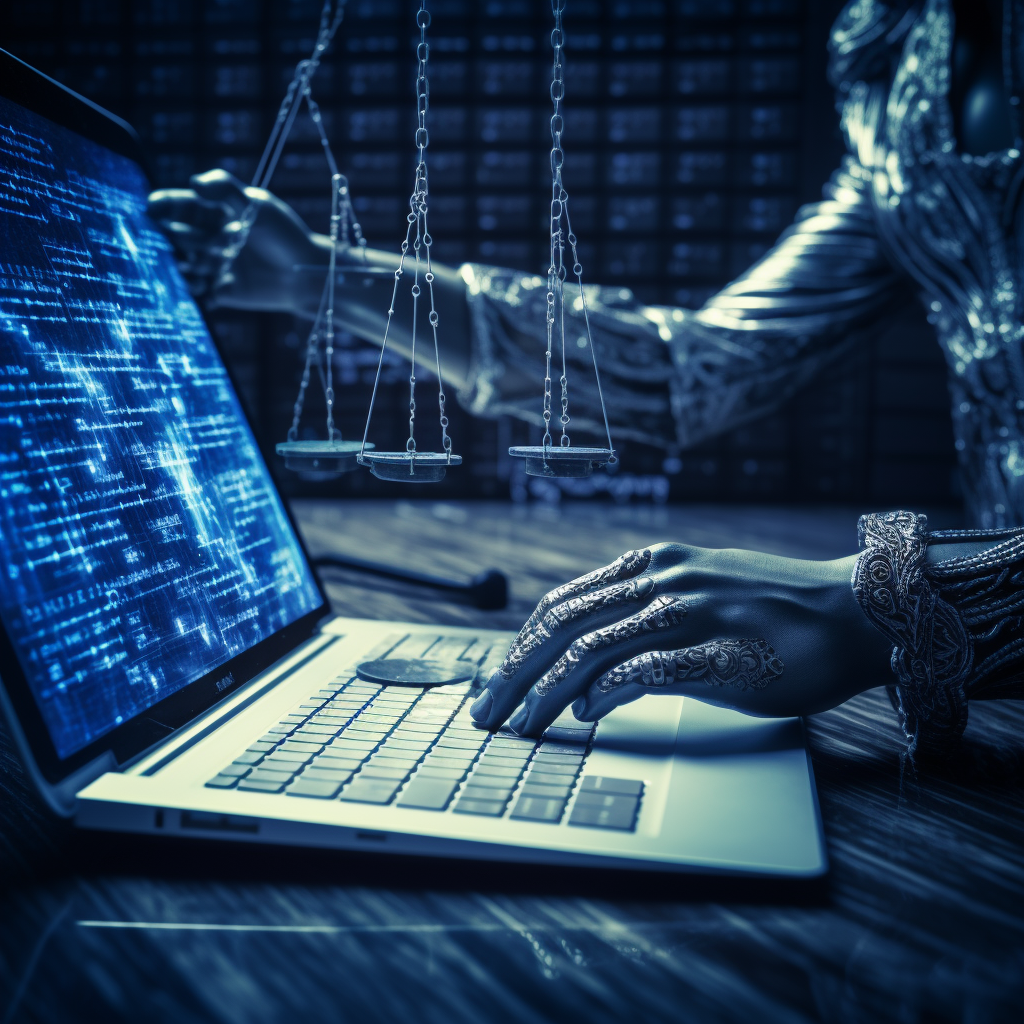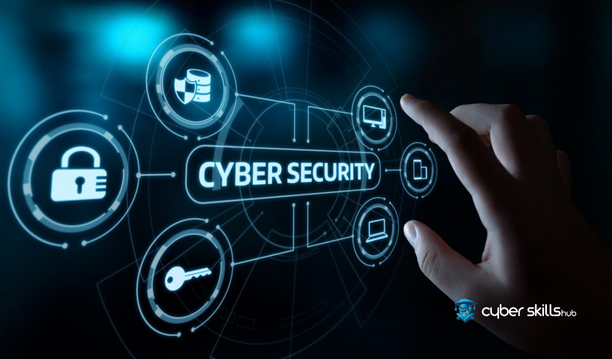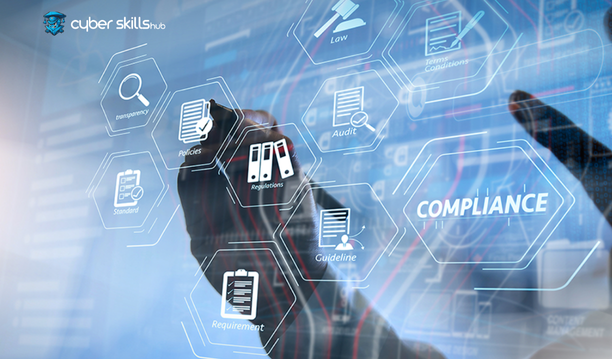Currently Empty: $0.00
Legal and Ethical Cybersecurity: The Importance of Compliance with CyberSkillsHub

Introduction
Cybersecurity has become an important issue in today’s digital world. Increasing cyber attacks every day put personal and corporate data at risk. In this context, it has become imperative that cybersecurity practices are addressed within the framework of legal and ethical standards.
Legal and Ethical Cybersecurity: An Overview
Cybersecurity is the practice of ensuring the security of information systems and networks. These include software, hardware, data, and operations. Cybersecurity is critical for protecting the sensitive information of individuals, organizations, and governments. It not only prevents financial damage but also maintains user trust and privacy. Different types of threats and attacks necessitate new and up-to-date security measures.
The Importance of Legal and Ethical Standards
The world of cybersecurity encompasses not only technical aspects but also legal and ethical dimensions. Legal regulations are critical in preventing data breaches and other abuses, identifying those responsible, and ensuring appropriate sanctions are applied.
Ethical standards, on the other hand, define the rules of conduct for cybersecurity professionals. This ensures that while protecting the confidentiality and integrity of users’ data, professionals also receive guidance on what is acceptable and what is unacceptable. Ethical violations can lead to legal consequences and may also damage an organization’s reputation.
Conclusion
Cybersecurity is a multidimensional and complex field. In addition to technical challenges, legal and ethical responsibilities are also of great importance in this area. Platforms such as CyberSkillsHub play a critical role in ensuring compliance and adherence to standards. This introduction highlights the importance of legal and ethical aspects in cybersecurity and provides an overview of the subject. It aims to serve as a resource for a more in-depth exploration of these topics in subsequent sections.

Legal Regulations and Cybersecurity
Cybersecurity is a rapidly growing and evolving field worldwide, and legal regulations in this area are developing at the same pace. Organizations must comply with both national and international laws to combat cybercrime and ensure protection. In this context, it is extremely important to understand what the legal regulations are, ensure compliance, and be aware of the legal consequences of potential violations.
National and International Laws
National Laws
Each country establishes its own legal framework for cybersecurity. These typically cover matters related to the protection of personal data, combating cybercrime, and national security.
- United States: In the United States, there are state-level regulations such as the California Consumer Privacy Act (CCPA). In addition, there are federal laws such as HIPAA and the Sarbanes-Oxley Act.
- EU: The European Union has established data protection standards among member states through the General Data Protection Regulation (GDPR).
- Other Countries: Different countries may have different legal regulations, so it is important to pay attention to local laws.
International Laws
At the international level, there are numerous multilateral agreements and regulations concerning cybersecurity. These include global frameworks against cybercrime, such as the Budapest Convention.
Legal Liability in Cases of Violation
Violation of legal regulations can lead to serious legal consequences. Here are some important points on this subject:
- Penalties and Sanctions: Data breaches and compliance failures can result in both fines and imprisonment.
- Reputational Damage: Legal violations can damage a company’s reputation, reduce customer trust, and lead to loss of business.
- Litigation Risk: Violations may lead to consumer lawsuits and regulatory investigations.
- Compliance Process: Deficiencies in the compliance process may be subject to rigorous scrutiny by the relevant regulatory authorities.
Conclusion
Legal regulations and cybersecurity are complex and constantly evolving fields that are critically important for organizations in every sector. Complying with national and international laws, implementing appropriate security measures, and understanding legal liabilities in the event of potential violations are essential for every organization in today’s world. Compliance requires not only legal obligations but also ethical responsibilities, as gaining the trust of customers, business partners, and all stakeholders is fundamental to a sustainable business model.
Ethical Standards
In the world of cybersecurity, ethical standards determine how professionals and organizations should behave. This encompasses a range of issues, from protecting user data to ensuring security protocols are properly implemented.
Professional Ethics Rules
Professional ethics rules define the moral and professional standards that employees in the cybersecurity sector must adhere to.
- Privacy: Customer and user data must be protected, prevented from being leaked, and secured against unauthorized access.
- Integrity: All transactions and business processes must be conducted in an honest, transparent, and fair manner.
- Responsibility: Cybersecurity professionals should be responsible for properly implementing security protocols and taking precautions against potential breaches.

Ethical Hacking and Responsibilities
Ethical hackers are used to test the security of systems and find vulnerabilities. The ethical aspects of this include:
- Authorization: Ethical hackers must have authorization to work on the systems they wish to test.
- Purpose: The purpose of ethical hackers is to enhance security and assist organizations, not to cause harm.
- Notice: Any vulnerabilities found should be reported to the appropriate authorities in a timely and appropriate manner.
Compatibility with CyberSkillsHub
CyberSkillsHub is a platform that promotes cybersecurity training and compliance. This section discusses how this platform works and what role it plays in the cybersecurity world.
The Role and Mission of CyberSkillsHub
- Education: CyberSkillsHub offers training for cybersecurity professionals, from beginner to advanced levels.
- Certification: The platform offers certifications that comply with industry standards, allowing professionals to demonstrate their skills.
- Industry Collaboration: CyberSkillsHub collaborates with industry leaders, educational institutions, and regulatory authorities.
Compliance Processes and Tools
- Compliance Assessments: CyberSkillsHub provides tools for organizations to assess their current compliance status.
- Development Plans: The platform can create customized development plans to address deficiencies and improve compliance.
- Continuous Support: CyberSkillsHub helps organizations maintain their security standards by providing ongoing support and updates.
Conclusion
Cybersecurity is not only a technical field, but also a complex issue related to ethics and compliance. Professional ethics rules, ethical hacking, and compliance with CyberSkillsHub are critical factors for success in this field.
Application and Case Studies
Success in cybersecurity can be understood by examining concrete applications and case studies. These analyses reveal industry trends, strategies, and success factors.
Successful Application Examples in the Industry
Successful application examples are an excellent opportunity to see what works in cybersecurity.
- Financial Sector: Banks’ advanced security protocols help protect customer data.
- Healthcare Sector: Hospitals use encryption and authentication methods to secure patient records.
- E-commerce: Online shopping sites use PCI compliance and secure payment systems to ensure the security of customer data.
Case Study Analyses
Case studies examine in depth how a particular situation or problem was addressed.
- Large-Scale Data Breach: How companies respond and how similar breaches can be prevented in the future.
- Ransomware Attack: How victims were targeted, how they responded, and what recovery process was followed.
Tips for Industry Professionals and Business Owners
Cybersecurity is a complex field for business owners and professionals. This section highlights best practices and the importance of compliance.
The Importance of the Compliance Process in Legal and Ethical Cybersecurity
Compliance is not only a legal requirement, but also part of maintaining safety standards.
- Regulatory Requirements: Complying with laws can increase customer confidence as well as avoid penalties.
- Security Protocols: Compliance processes include the protocols necessary for data security and system protection.
Best Practices in Application
Best practices in cybersecurity reduce risks and increase operational efficiency.
- Regular Updates: Regularly updating software and systems can close known security vulnerabilities.
- Education and Awareness: Training employees provides protection against human-induced threats such as social engineering attacks.
- Multi-Factor Authentication: This provides an additional layer of security to prevent unauthorized access.
Conclusion
Cybersecurity is a constantly evolving and changing field. Case studies and practical applications are important tools for understanding what works, and best practices and compliance processes are also vital for business owners and professionals. This article addresses these topics in detail, providing readers with concrete information on how to succeed in the world of cybersecurity.
Conclusion
Throughout this article, we have conducted an in-depth examination of legal regulations, ethical standards, compliance processes, successful implementation examples, and best practices in the world of cybersecurity. Here is a summary of the main points and expectations for the future:
Legal and Ethical Cybersecurity: Summary of Key Points
- Legal and Ethical Standards: Compliance with laws and ethical rules in cybersecurity is fundamental to doing business correctly.
- Ethical Hacking: Ethical hackers are critical for enhancing security and identifying vulnerabilities.
- CyberSkillsHub Compliance: This platform plays a significant role in the cybersecurity world by promoting education and compliance.
- Application and Case Studies: These examples are a valuable tool for understanding what works.
- Compliance and Best Practices: Compliance processes and best practice tips are vital for business owners and professionals.
Legal and Ethical Cybersecurity: Expectations for the Future
- Stricter Regulations: Legal requirements are expected to increase and regulations are expected to become even stricter.
- Technological Advancements: The continuous advancement of cybersecurity technology will provide more effective protection and compliance.
- The Increasing Role of Training: Training employees and professionals will continue to provide effective protection against human-related threats.
Frequently Asked Questions Regarding Legal and Ethical Cybersecurity
What is CyberSkillsHub and what role does it play?
CyberSkillsHub is a platform designed to train and certify cybersecurity professionals. By offering courses for both beginners and advanced professionals, it helps them comply with industry standards.
Why are legal regulations important in cybersecurity?
Legal regulations help prevent data breaches and abuses, ensure that those responsible are identified and that appropriate sanctions are applied. They are also mandatory for protecting the security of institutions and the privacy of customers.
How do ethical standards function in cybersecurity?
Ethical standards guide cybersecurity professionals on what is acceptable and what is not. They protect the privacy of users’ data while also defining rules of professional conduct.
What is ethical hacking and what do ethical hackers do?
Ethical hackers test and find vulnerabilities in order to improve system security. Their job is to identify system weaknesses within an authorized and ethical framework and report this information to the relevant parties.
How do international laws play a role in cybersecurity?
International laws encourage cooperation between different countries on cybersecurity and help develop common standards and procedures to combat cybercrime. Agreements such as the Budapest Convention are used for this purpose.
Why are compliance processes important in cybersecurity?
Compliance processes evaluate how organizations adhere to legal and ethical requirements. These processes help avoid potential legal penalties, increase customer trust, and prevent data breaches.
Bibliography
References used to support the research and information behind this article and sources for further reading:
- Legal Regulations and Cybersecurity: Veale, M. & Brown, I. (2020). Cybersecurity. Internet Policy Review, 9(4). https://doi.org/10.14763/2020.4.1533
- Ethical Standards: Manjikian, M. (2017). Cybersecurity Ethics: An Introduction (1st ed.). Routledge. https://doi.org/10.4324/9781315196275
- Compatibility with CyberSkillsHub: CyberSkillsHub.
- Application and Case Studies in Cybersecurity: Donalds, Charlette & Barclay, Corlane & Osei-Bryson, Kweku-Muata. (2022). Cybercrime and Cybersecurity in the Global South: Concepts, Strategies and Frameworks for Greater Resilience. 10.1201/9781003028710.
- Tips for Industry Professionals and Business Owners: “Cybersecurity Best Practices for Boston Businesses,” Integris IT. [Online]. Available: https://integrisit.com/cybersecurity-best-practices-for-boston-businesses/





